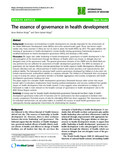The essence of governance in health development

View/
Date
2011Author
Kirigia, Joses Muthuri
Kirigia, Doris Gatwiri
Metadata
Show full item recordAbstract
Governance and leadership in health development are critically important for the achievement of the health Millennium Development Goals (MDGs) and other national health goals. Those two factors might explain why many countries in Africa are not on track to attain the health MDGs by 2015. This paper debates the meaning of ‘governance in health development’, reviews briefly existing governance frameworks, proposes a modified framework on health development governance (HDG), and develops a HDG index. We argue that unlike‘ leadership in health development’,‘governance in health development’ is the sole prerogative of the Government through the Ministry of Health, which can choose to delegate (but not abrogate) some of the governance tasks. The general governance domains of the UNDP and the World Bank are very pertinent but not sufficient for assessment of health development governance. The WHO six domains of
governance do not include effective external partnerships for health, equity in health development, efficiency in
resource allocation and use, ethical practises in health research and service provision, and macroeconomic and
political stability. The framework for assessing health systems governance developed by Siddiqi et al also does not
include macroeconomic and political stability as a separate principle. The Siddiqi et al framework does not propose
a way of scoring the various governance domains to facilitate aggregation, inter-country comparisons and health
development governance tracking over time. This paper argues for a broader health development governance framework because other sectors that assure human rights to education, employment, food, housing, political participation, and security combined have greater impact on health development than the health systems. It also suggests some amendments to Siddigi et al’s framework to make it more relevant to the broader concept of ‘governance in health development’ and to the WHO African Region context. A strong case for broader health development governance framework has been made. A health development governance index with 10 functions and 42 sub-functions has been proposed to facilitate inter-country comparisons. Potential sources of data for estimating HDGI have been suggested. The Governance indices for individual sub-functions can aid policy-makers to establish the sources of weak health governance and subsequently develop appropriate interventions for ameliorating the situation.
